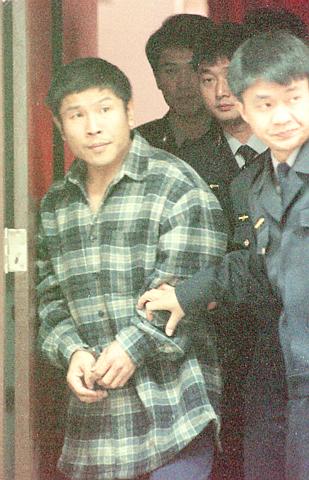Taiwan's most notorious criminal, Chen Chin-hsing (
Prosecutor Chang Hwei-chiung (
Despite previous media reports yesterday that Chen might be executed as early as last night, the order had not reached Yeh's office as of yesterday afternoon.

PHOTO: LU CHUN-WEI, LIBERTY TIMES
Chen's case has been marred by disputes over the validity of the law applied to his case. Human rights groups and some legal experts argue that the Act for the Control and Punishment of Banditry (懲治盜匪條例), commonly known as the "bandit law," violates basic human rights and is no longer valid. They say that the government has repeatedly ignored one article of the 1944 law requiring its annual renewal to stay in effect.
However, the legislature, the Ministry of Justice, and the Supreme Court all recently concluded that the law is still in effect.
As the legal debate continues, Yeh has yet to order executions of nine others convicted under the law, including the famous Hsichih trio, who many lawyers believe have been wrongly convicted.
Chen and two accomplices plunged Taipei into a security nightmare in April 1997 when they kidnapped the 17-year-old daughter of entertainer Pai Ping-ping (白冰冰). Together with Lin Chun-sheng (林春生) and Kao Tien-min (高天民), Chen was on the run from police for seven months after kidnapping and beating the girl to death.
The case triggered public anger over the government's perceived inability to stem deteriorating social order. The outrage culminated in street demonstrations in May 1997, when tens of thousands of people demanded the resignation of then-premier Lien Chan (連戰).
While on the run, Chen and his gang committed two more kidnappings and a grisly triple murder at a plastic surgeon's clinic in October. Lin and Kao were eventually killed in separate shootouts with the police. Chen, meanwhile, later admitted to having preyed on many young women living alone in Taipei and raping them.
The drama ended in November when Chen broke into the residence of the South African military attache and held his family hostage for 24 hours before surrendering.
While on death row, Chen handed a 50,000-character confession to a Christian group. The Ministry of Justice reacted strongly to the group's plan to have his confessions published. The group has postponed the publication.

DAREDEVIL: Honnold said it had always been a dream of his to climb Taipei 101, while a Netflix producer said the skyscraper was ‘a real icon of this country’ US climber Alex Honnold yesterday took on Taiwan’s tallest building, becoming the first person to scale Taipei 101 without a rope, harness or safety net. Hundreds of spectators gathered at the base of the 101-story skyscraper to watch Honnold, 40, embark on his daredevil feat, which was also broadcast live on Netflix. Dressed in a red T-shirt and yellow custom-made climbing shoes, Honnold swiftly moved up the southeast face of the glass and steel building. At one point, he stepped onto a platform midway up to wave down at fans and onlookers who were taking photos. People watching from inside

A Vietnamese migrant worker yesterday won NT$12 million (US$379,627) on a Lunar New Year scratch card in Kaohsiung as part of Taiwan Lottery Co’s (台灣彩券) “NT$12 Million Grand Fortune” (1200萬大吉利) game. The man was the first top-prize winner of the new game launched on Jan. 6 to mark the Lunar New Year. Three Vietnamese migrant workers visited a Taiwan Lottery shop on Xinyue Street in Kaohsiung’s Gangshan District (崗山), a store representative said. The player bought multiple tickets and, after winning nothing, held the final lottery ticket in one hand and rubbed the store’s statue of the Maitreya Buddha’s belly with the other,

‘NATO-PLUS’: ‘Our strategic partners in the Indo-Pacific are facing increasing aggression by the Chinese Communist Party,’ US Representative Rob Wittman said The US House of Representatives on Monday released its version of the Consolidated Appropriations Act, which includes US$1.15 billion to support security cooperation with Taiwan. The omnibus act, covering US$1.2 trillion of spending, allocates US$1 billion for the Taiwan Security Cooperation Initiative, as well as US$150 million for the replacement of defense articles and reimbursement of defense services provided to Taiwan. The fund allocations were based on the US National Defense Authorization Act for fiscal 2026 that was passed by the US Congress last month and authorized up to US$1 billion to the US Defense Security Cooperation Agency in support of the

‘COMMITTED TO DETERRENCE’: Washington would stand by its allies, but it can only help as much as countries help themselves, Raymond Greene said The US is committed to deterrence in the first island chain, but it should not bear the burden alone, as “freedom is not free,” American Institute in Taiwan Director Raymond Greene said in a speech at the Institute for National Defense and Security Research’s “Strengthening Resilience: Defense as the Engine of Development” seminar in Taipei yesterday. In the speech, titled “Investing Together and a Secure and Prosperous Future,” Greene highlighted the contributions of US President Donald Trump’s administration to Taiwan’s defense efforts, including the establishment of supply chains for drones and autonomous systems, offers of security assistance and the expansion of